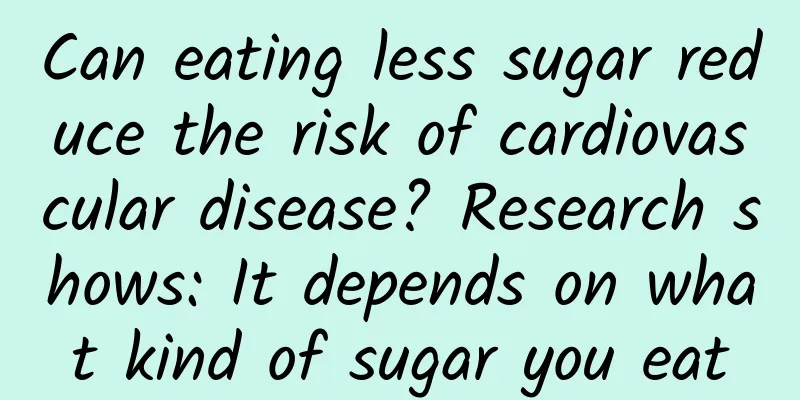Can eating less sugar reduce the risk of cardiovascular disease? Research shows: It depends on what kind of sugar you eat

|
Written by: Nan An It’s common to hear that “eating less carbohydrates is good for your heart health.” There are also studies that show that total carbohydrate intake is neither harmful nor beneficial to cardiovascular health. However, a recent study confirms that the quality of carbohydrates may be a more critical factor in determining cardiovascular disease outcomes than the amount of carbohydrates consumed. This means that the statement that "eating less carbohydrates is good for heart health" is not true , and the type and source of dietary carbohydrates are more important. The related research paper, titled "Associations between types and sources of dietary carbohydrates and cardiovascular disease risk: a prospective cohort study of UK Biobank participants", has been published in the scientific journal BMC Medicine. The number one killer threatening human health: cardiovascular disease Cardiovascular disease refers to diseases related to the heart or blood vessels, also known as circulatory system diseases. Common cardiovascular diseases include coronary artery syndrome, stroke, hypertensive heart disease, rheumatic heart disease, aneurysm, cardiomyopathy, atrial fibrillation, congenital heart disease, endocarditis, and peripheral arterial occlusive disease. Heart attacks and strokes are often caused by a combination of risk factors , such as tobacco use, unhealthy diet and obesity, physical inactivity and harmful use of alcohol, high blood pressure, diabetes and hyperlipidemia. According to data released by the World Health Organization (WHO), 17.9 million people die from cardiovascular disease each year, equivalent to one in every three deaths; data from the World Heart Observatory show that in just 30 years, the prevalence of cardiovascular disease has almost doubled, from 271 million in 1990 to 523 million in 2019. More specifically, one-third of CVD deaths occur in people under 70 years of age; 85% of CVD deaths are due to heart attacks and strokes ; and more than 75% of CVD deaths occur in low- and middle-income countries. Although humans have made considerable progress in the prevention and treatment of cardiovascular disease over the past half century, it remains one of the major causes of death and disability in the world today. Free sugars are the "fatal sweetheart" of cardiovascular disease Previously, there have been few large observational studies on dietary carbohydrates and cardiovascular disease risk, with detailed analyses of the types and sources of carbohydrates. Dr. Rebecca K. Kelly's team at the University of Oxford and her collaborators analyzed data from 110,497 individuals in the UK Biobank who had completed at least two and up to five dietary assessments and who were free of cardiovascular disease and diabetes when they were initially surveyed. During approximately 9.4 years of follow-up, these individuals' carbohydrate intake during this period was associated with 4,188 cases of cardiovascular disease, 3,138 cases of ischemic heart disease, and 1,124 cases of stroke. In order to evaluate the relationship between dietary carbohydrate types and sources and the incidence of cardiovascular disease, this study innovatively studied the relationship between free sugars and cardiovascular disease risk based on the definition revised by the World Health Organization and the UK Scientific Advisory Committee on Nutrition in 2015, and supported the global dietary recommendation that free sugar intake should be less than 5% of total energy . The research team found that total carbohydrate intake was not associated with cardiovascular disease outcomes. However, after differentiating between the type and source of carbohydrates, they found that the more free sugars consumed from food (sources included sweetened drinks, juices and sweets), the higher the associated cardiovascular disease risk. For every 5% increase in the proportion of free sugars in total daily energy intake, the risk of total cardiovascular disease will increase by 7% , including a 6% increase in the risk of heart disease and a 10% increase in the risk of stroke; for every additional 5 grams of dietary fiber consumed per day, the risk of total cardiovascular disease will decrease by 4%, but this correlation is no longer significant after taking into account body mass index (BMI). Figure | Carbohydrate intake and the incidence of three types of diseases in the subjects (Source: BMC Medicine) This means that replacing the free sugars we consume daily with non-free sugars and increasing dietary fiber intake may reduce the risk of cardiovascular disease. At the same time, increasing the intake of fiber and whole grain foods can also improve cardiometabolic risk indicators (such as obesity and blood pressure). Is there any difference between carbohydrates, sugars and free sugars? Carbohydrates are chemically divided into monosaccharides and disaccharides, polyols, oligosaccharides and polysaccharides (starch and non-starch), which can also be divided into free sugars and non-free sugars. Among them, free sugars refer to all monosaccharides and disaccharides added to food by manufacturers, cooks or consumers, plus sugars naturally present in honey, syrups and unsweetened fruit juices; non-free sugars are all sugars excluded from the definition of free sugars, most of which are naturally present in fruits, vegetables and dairy products. Finally, the research team concluded that not all carbohydrates are associated with cardiovascular disease risk, and the type and source of carbohydrates, especially sugars, are important factors to consider when studying cardiovascular health. Therefore, understanding the types of carbohydrates and the differences between free sugars and non-free sugars can help us pay attention to the types of sugar we consume in our daily diet and consciously protect our cardiovascular health from a dietary perspective. How should we deal with heart "bad luck"? The World Heart Federation launched the World Heart Vision 2030: Driving Policy Change at the World Congress of Cardiology, depicting an achievable future that improves health outcomes, saves costs and prolongs lives, while ensuring access to care for the most vulnerable. At the same time, the World Heart Federation is committed to helping achieve the United Nations Sustainable Development Goals - to reduce premature mortality from cardiovascular disease by 33% by 2030. WHO has identified “best buys” or highly cost-effective interventions for preventing and controlling cardiovascular disease that are feasible to implement even in low-resource settings: Comprehensive tobacco control policy; Introducing taxes to reduce intake of fat, sugar and high-salt foods; paving walking and cycling paths to increase physical activity; strategies to reduce harmful use of alcohol; Provide healthy school meals to children. As Professor Fausto Pinto, President of the World Heart Federation, said, “Up to 80% of cardiovascular disease could be prevented if we build better infrastructure, expand access to healthcare, rethink the way we produce and consume food, and clean the air we breathe.” Reference Links: https://doi.org/10.1186/s12916-022-02712-7 https://zh.wikipedia.org/wiki/%E5%BF%83%E8%A1%80%E7%AE%A1%E7%96%BE%E7%97%85 https://www.who.int/en/news-room/fact-sheets/detail/cardiovascular-diseases-(cvds) https://worldheartobservatory.org/ https://www.who.int/en/news-room/fact-sheets/detail/cardiovascular-diseases-(cvds) |
Recommend
The core content of short videos is the topic! It is crucial to choose the right topic for short videos!
Many people say that short videos are king of tra...
Can the female anchors who earn millions a year support the future of Momo?
At the end of October, this girl was not too cold...
How can Samsung remain surviving despite facing three major controversies: product, company and politics?
If it were any other company that encountered mul...
91 Ten Articles - New Energy Vehicle Industry Briefing: Sony Concept Electric Vehicle to be Open to the Public at the End of the Month
1. Benefiting from the clear-cut electric vehicle...
Look! There’s an “ice cream” on the tree!
Review expert: Ran Hao, a well-known popular scie...
Exclusive interview with BroadLink's Liu Zongru: Only an open ecosystem can lead to a future in 2015
[[126603]] 2014 is a key year for the rapid devel...
Why does Xiaomi Tablet use a 7.9-inch retina screen?
Yesterday, Huawei released the 8-inch tablet M1, p...
Why do you always fail in promotion?
After three months of closed development, the App...
If an employee voluntarily gives up social insurance, the employer cannot be exempted from liability! What exactly happened? What are the consequences of giving up? Details attached!
Nowadays, almost all companies will pay social se...
Shocking news! We actually drank water from the same mouth as dinosaurs! What do you think about this?
The cover image and the images in this article ar...
The mediaization process of enterprises: a good opportunity for media transformation
Chen Tong's resignation caused quite a stir i...
Ant's friends
Image source: antwiki Ants have clear division of...
Cheyun: The 2022 new energy city sales ranking is released. Shanghai ranks first with cumulative sales of 188,000 vehicles
Insurance data show that in the first nine months...
If you are worried about not completing your work plan for the second half of the year, these 3 tips can save you!
People who are familiar with me will know that I ...
Beware of "Autumn Sadness Syndrome"! Autumn is the peak season for depression and other "emotional illnesses"
Since the beginning of autumn, the number of pati...









